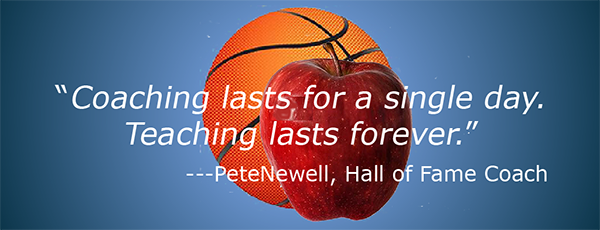Coaching, Life Skills, & Keys to Success
The Art of Teaching Basketball
What you will discover or recall:
Coaching Today
Teaching of Life Skills
Keys to Successful Coaching
Coaching Today
In recent years, winning has become the primary focus in sports. This is even true on the collegiate and high school levels where the emphasis should be on education and learning. Coaches and programs are being evaluated by the number of games won rather than their program model and teaching abilities. Unfortunately, along with this increased importance being placed on winning, there has been a significant slippage in coaches’ teaching skills and abilities.
During the “Off” season, organized full court games and tournaments have replaced skill building. These are mostly unregulated and lucrative endeavors with no required coaches’ training or certification. Participation in these programs require exorbitant financial burdens. This year around competition also leads to player burn out and injuries.
With the addition of women’s sports, the demand for facility usage has resulted in reduced court time for adequate instruction and practice. In the past, coaches had more time for detailed explanations on the “How’s” of skills and techniques along with “When‘s” and “Why’s.” They also had the luxury of working with players before and after practices.

Teaching of Life Skills
In the past basketball was mainly a school activity. Athletics were originally adopted by schools not to teach shooting, passing, and dribbling, etc. but rather life skills such as teamwork, dependability, reliability, hard work, playing through adversity, physical conditioning, etc. Coaches were full time certified teachers with athletics being extracurricular activities. Teaching and physical education degrees required four years of training and an additional year for certification. They were trained in physiology of exercise, human anatomy, kinesiology, biomechanics & motor learning, prevention & care of Injuries, along with educational classes, such as the laws of learning, teaching methods, public speaking, psychology, media & technology, and student teaching.
Today anyone can coach. Currently, many school districts are now entrusting their basketball programs to off campus coaches, most of which are untrained. On the youth level, programs are desperate for trained coaches. Being a coach carries awesome power and responsibility. Before you step onto the court, be sure that you understand the ramifications of the responsibilities and liabilities that go along with coaching.
Like players, coaches never stop learning. To be successful, coaches must be self-motivated and rely entirely on themselves when it comes to developing and improving their coaching skills and techniques. Coaching, like fine wine, takes time and effort. It does not come over night. Coaches must have patience since it takes hours, days and years to become a very proficient coach. However, the satisfaction in helping their players become their best they are capable, “On and Off” the court is priceless.
Coaching Demeanor

A coach’s appearance and demeanor sets the tone for a conducive, learning environment. Therefore, it is important that all coaches dress appropriately for practice, be fully aware of the importance of positive body language, and earn the respect of all your players by being reliable, consistent and fair.
A coach must be well organized and prepared along with being early to all games and practices. All practices should be well planned and executed. Yet, be flexible and ready to improvise. Sometimes even the best of well laid out plans can go awry or get disrupted.
As a coach you must have patience. Players, on all levels of the game are going to miss shots, make crucial turnovers, and commit needless fouls. They need the freedom to make mistakes. It’s the coach’s job to help players learn from those mistakes. That takes time and patience.
Communication
It’s not enough to know your subject, you must also be aware of your player audience. Coaches must be good at explaining things. Terminology is the only thing in the game of basketball that changes over time. Since players receive instruction from a variety of sources, it is very important that the entire coaching staff use the same offensive and defensive terms.
Communicate by keeping it simple. Talk to your players’ level. Clarify rather than confuse. Go beyond just the HOW’s, and teach the WHEN’s & WHY’s of various basketball skills and techniques. Tell them what you are going to teach them, then teach them, and finally, tell them what you taught them.
Be sure to teach your players to listen. It is imperative that any time a coach talks everyone listens (including assistant coaches). Demand and get eye contact of all players prior to speaking. Use positive reinforcement and point out successful performances rather than negative ones.
Use constructive criticism when appropriate, but never yell. Have you ever heard of a teacher yelling at their students? Be a role model and never use profanity. Educated people can express themselves very clearly without the use of profanity.
Fostering a Team Atmosphere

On every level of basketball, one of the most important aspects of coaching is creating and fostering a total team atmosphere and commitment. It is the difference between success and failure. Insure your players that they are going to play in a team atmosphere. Inform them that you are not going to tolerate anyone on the team that keeps others from learning, you from coaching, or any other misbehavior. Great teams are a result of their best players being the hardest workers. No one steps on the floor without a full hustle attitude. Insist on a team effort at all times.
Persistence

Changing a “Me” to a “We” attitude is a real challenge in coaching, and is of the utmost importance to success. There is an old adage that is often times quoted: “Great teams play hard, play smart and play together.” However, there is one other very important ingredient that is missing and that is “persistence.”
Persistence is what enables players and teams to reach their full potential and goals. It is what separates the great ones from the mediocre ones. Most teams can play hard, play smart, and together for short periods of time. However, to be successful, they must be able to sustain this high level of effort over the course of the entire season which is no easy task.
Demand “Best Efforts” at All Times
Habits do not change in a game. Never tolerate or ignore a player’s laid-back or apathetic attitude and efforts. All great players have one thing in common, they have great work ethics and will not be outworked by anyone. They pay attention to detail. Too much attention and recognition is paid to records and accomplishments, and not enough to the long, hard, hours, days, and years great players put into developing and refining their skills and techniques that make them so successful. In tolerating or ignoring a lack of effort and selfishness, coaches are not only cheating the team, but just as importantly, they are cheating the player and depriving them of any future opportunity to play on a higher level of the game.
Team Leadership
Every team needs at least one leader – a coach on the floor. One that plays with intelligence and poise. They sacrifice and surrender “me” to “we.” This unselfish play makes their teammates better. Leaders play in the future constantly anticipating ahead of the current action. As a result, the game is actually played in slow motion to them. In thinking ahead, their heads are always in the game, which allows them to play through adversity. They rarely get upset or loose their poise.
On the other hand, players playing in the present, or worst yet, playing in the past, such as arguing about a bad call or being upset about a teammates turnover, the game becomes more difficult and actually speeds up dramatically as they lag behind and attempt to catch up with the action.

Establish Significant Player Roles
Guarantee players that they will receive equal opportunities, but not equal playing time. Develop and establish significant roles and assignments for every player on the squad such as 6th Person, Defensive Stopper, Designated Inbounder, etc. Championships are never achieved without the unselfish play of the complementors on the team. These supporting roles, which are vital to a total team effort, must be constantly acknowledged and reinforced by the entire coaching staff throughout the season.
To learn more about vital player roles – Click Here
Real Competitors are Vital to a Team Effort
Real competitors are those special players that come to play every time they step on the court. They are a team’s hardest workers constantly battling and competing. They are not the type that scream at their teammates or officials or kick trash cans after the game. Instead, they dive for loose balls, take charges, fight for rebounds, etc. They just plain enjoy playing and never give up. Competitors are those players that players love to play with not against, spectators love to watch, and coaches love to coach. You cannot win without them.
To learn more about “Real Competitors” – Click Here

The real success in coaching comes with teaching and assisting players to become the best they are capable of becoming “On” and “Off” the court. Too many players are having bad experiences with coaches. Please make sure that the time that ALL of your players spend with you is a very rewarding and positive experience.

_____________________
Coming Next:
Legal Liabilities
_____________________

| #1 | Coaching, Life Skills, Keys to Success | Tap Here to View |
| #2 | Legal Liabilities | Tap Here to View |
| #3 | Major Medical Emergencies | Tap Here to View |
| #4 | Motivation | Tap Here to View |
| #5 | Player Learning Styles | Tap Here to View |
| #6 | Motor Skill Learning | Tap Here to View |
| #7 | Game of Habits | Tap Here to View |
| #8 | Changing Bad Habits | Tap Here to View |
| #9 | Goal Setting & Season Review | 8/25/2020 |
_____________________
Posted: June 30th, 2020 under Coaching Strategies | Game Strategies | Player Development | Practice Strategies.
Tags: Appearance, Best Efforts, Coaching, Coaching Staff, Communication, Competitors, Leaders, Learning, Life Skills, Persistence, Skills & Techniques, Success, Teaching, Team Atmosphere, Teamwork



Comment from GIANNI
Time January 25, 2024 at 10:53 am
Good evening I have your book
I would like to ask if you are thinking of renewing your thoughts with new exercises etc.
Congratulations.